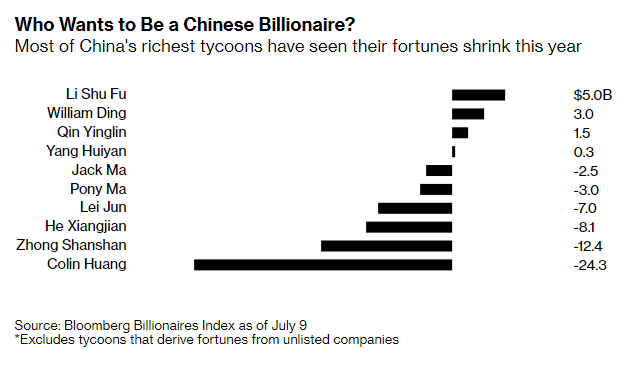The world’s billionaire manufacturing “factory” is shaken by Beijing’s new policies
- Tram Ho
However, the main character this time is not a Chinese billionaire who has almost not appeared in public for about 8 months. It was Mark Zuckerberg, appearing on a hydraulic surfboard, holding an American flag in his hand and exuding the confidence of a man holding $130 billion.
There is a stark contrast between the image of the social media mogul in the video posted to Instagram on July 4 and what is happening in China. Just hours before Mark posted the video, Beijing had just banned Didi Chuxing’s ride-hailing app from app markets. This is the latest storm to hit a group of entrepreneurs once worshiped as the ones who will challenge US tech billionaires on the global super-rich rankings.

That is the kind of PR that makes a lot of noise that perhaps Jack Ma has always wished for.
It seems their era is coming to an abrupt end.
While the 10 richest billionaires in the world added a total of 209 billion USD in the first 6 months of 2021, the richest Chinese billionaires in the Bloomberg Billionaires Index had to see their total assets decrease by 16 billion USD. in the same period. Shares of “flagship” companies have fallen by an average of 13%, the first time in at least 6 years that this group has failed despite the Chinese stock market rallying.
Since listing on the NYSE on June 30, Didi shares have dropped 14%, wiping out nearly $800 million in assets of the co-founders.

Most of China’s richest billionaires have lost money so far this year.
The source of the story begins with Beijing’s campaign to punish technology giants, which has only become tense since November last year, when Jack Ma’s Ant Group was forced to cancel a huge IPO on the stock market at a moment. last. Chinese policymakers are tightening regulation across many of the most important areas, from financial services to the Internet and data networks that underpin most of the country’s large enterprises. modern Chinese economy.
In the latest move, Chinese officials yesterday announced a new bill that requires thorough inspection of nearly all domestic companies for cybersecurity issues before they list shares in China. foreign.
China has multiple motives behind this campaign. There are concerns about anticompetitive behavior in the technology industry, the risks that threaten the stability of the financial system that are not strictly regulated by lending platforms, and also the concern of corporations. large collection of sensitive personal data.
However, China has also revealed its ambition to clamp down on tycoons, many of which have gained too much influence over the $14 trillion economy. As one government official described it, Beijing wants to prevent billionaires from becoming the powerful force that dominates the economy and many aspects of politics like the chaebols in South Korea.
There are also growing concerns about inequality. In his keynote speech on economic plans last October, President Xi Jinping acknowledged that the country’s development was “out of balance” and that “common prosperity” should be the goal. Top.
New role model for billionaires
These changes usher in a new era for Chinese billionaires and their backers. Gone are the days when billionaires like Jack Ma were able to bend the rules so that the company they founded excelled and challenged even state-owned banks. Fame and strong personal brand – once considered a valuable asset of China’s tech billionaires – are now like a debt. The new secret for China’s super-rich is humility, more philanthropy, and a focus on employee well-being.
There have been many examples proving the new truth. Ma, who publicly criticized China’s financial system regulator on the eve of Ant’s IPO, has appeared only a few times since then and has been cautious. Colin Huang, the founder of Pinduoduo, which was recently investigated for allegedly exploiting employees, has stepped down as chairman and CEO and donated billions of dollars worth of stock to charity. ByteDance founder Zhang Yiming also said in May that he plans to step down as CEO and devote more time to philanthropy in the education industry.
Eric Schiffer, CEO of Patriarch Organization, a private company in Los Angeles, commented: “The new environment will change the Chinese technology sector completely, in part because investors will be reluctant to invest. capital for entrepreneurs could be on the radar of Beijing.”
In the US, President Joe Biden is also targeting the billionaire class, calling for an increase in taxes on the rich and just two days ago signing an executive order to reduce the dominance of Big Tech. However, the big difference between the US and China is that China will be much stronger and the context can change rapidly at any time.
Beijing has so many tools to target billionaires, that arrest would be the highest degree. Investigations into antitrust, cybersecurity, and other issues are more common ways to “fix” the tech giants. The Chinese government also uses “soft” measures such as media campaigns on state television.
For example, a few days after Ant’s IPO was postponed, Mr. Xi visited a museum in the city of Nantong. This is a museum built by Zhang Jian, a 19th century capitalist. He describes Zhang as a country builder and a patriotic philanthropist. Instead of rattling the financial system with unregulated loans, Zhang built factories and hundreds of schools.
Not only technology, billionaires in the real estate sector have also faced many difficulties in recent years. Officials have tightened capital into real estate in an effort to curb the rise in house prices and reduce systemic risk. Billionaire Hui Ka Yan, chairman of China Evergrande Group, has lost $6.7 billion so far this year, or 30% of his fortune, after Evergrande shares plunged.
Is this bad or good?
The big question now is whether all of this is good for China in the long run. There is a risk that the constantly changing and volatile policy environment will erode investor confidence. As a result, entrepreneurs do not have access to the resources needed to turn their ideas into reality. Foreign venture capital funds will rethink investing in Chinese companies if Beijing prevents them from listing shares abroad.
Of course, it is undeniable that new policies bring many benefits, such as increasing competition in the technology industry, which is dominated by giants, paving the way for a new generation of billionaires to emerge. Stricter regulations for fintech companies help reduce systemic risk, albeit with a negative impact on innovation.
Either way, Chinese entrepreneurs have no choice but to find a way to adapt to the “new normal”, said Chen Long, an expert at consulting firm Plenum. “The good old days are a story of the distant past.”
Source : Genk
